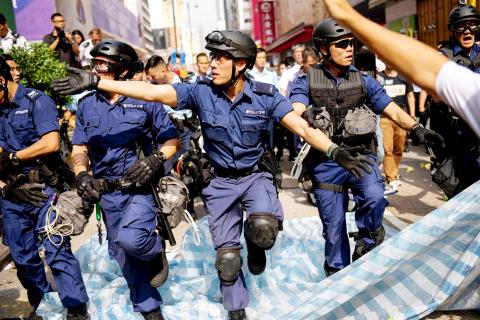Hundreds of Hong Kong police yesterday cleared a pro-democracy protest camp, arresting Joshua Wong (黃之鋒) and another student leader, and reopening a main road blocked for almost two months.
Pushing back protesters, police with the help of workmen removed tents and other obstacles blocking the six-lane Nathan Road in Mong Kok district.
It is seen as the most significant move so far in efforts to clear away protest camps at three separate locations in the territory, as public sympathy with the demonstrators wanes.

Photo: AFP
Scuffles broke out earlier in the day as police wearing helmets and brandishing batons moved in to protect the workmen from the crowds that surged forward to try to stop them tearing down road barricades.
The operation went ahead a day after nearly 150 demonstrators were arrested as authorities cleared a smaller section of the Mong Kok protest camp.
Hundreds of police quickly pushed protesters back, and removed wooden and metal barricades, tents and other obstructions along a 500m stretch of Nathan Road.
About two hours after the operation started, only a handful of protesters remained at the edge of the site.
The movement’s student leaders Wong and Lester Shum (岑敖暉) were arrested at the scene, according to protest group Scholarism and the Hong Kong Federation of Students.
A well-known protester and member of the League of Social Democrats, Raphael Wong (黃浩銘), who was arrested along with the pair, said on his Facebook page that they were being held at a police station.
“I am at the Kwai Chung police station, next to me is Joshua and Lester, we have been charged with contempt of court and obstructing public officers,” Wong wrote. “It is possible we won’t get bail tonight and will be at a magistrates’ court tomorrow.”
Police were unable to immediately give a reason why the three had been arrested when contacted.
Tensions were running high yesterday after scuffles the previous day when police used pepper spray on protesters at the site.
Mong Kok was the scene of some of the most violent clashes since the sit-ins began in the territory on Sept. 28.
Demonstrators are demanding fully free elections for the leadership of the semi-autonomous southern Chinese territory in 2017, but China has refused to budge on its arrangements for the poll.
Police said they arrested at total of 148 people, including a 14-year-old boy, in the two-day Mong Kok operation and that 22 police officers were injured.
Separately, seven police officers who were suspended after a video emerged of them beating and kicking a handcuffed man have been arrested.
“Police have arrested seven police officers suspected of assault causing bodily harm,” police said in a statement late yesterday, adding that investigations were ongoing.
The video that emerged last month showed plainclothes officers hauling a handcuffed and unarmed demonstrator to a dark corner of a protest-hit public park.
One officer stands over the man and punches him, as three others are seen repeatedly kicking him.

SECURITY: As China is ‘reshaping’ Hong Kong’s population, Taiwan must raise the eligibility threshold for applications from Hong Kongers, Chiu Chui-cheng said When Hong Kong and Macau citizens apply for residency in Taiwan, it would be under a new category that includes a “national security observation period,” Mainland Affairs Council (MAC) Minister Chiu Chui-cheng (邱垂正) said yesterday. President William Lai (賴清德) on March 13 announced 17 strategies to counter China’s aggression toward Taiwan, including incorporating national security considerations into the review process for residency applications from Hong Kong and Macau citizens. The situation in Hong Kong is constantly changing, Chiu said to media yesterday on the sidelines of the Taipei Technology Run hosted by the Taipei Neihu Technology Park Development Association. With

CARROT AND STICK: While unrelenting in its military threats, China attracted nearly 40,000 Taiwanese to over 400 business events last year Nearly 40,000 Taiwanese last year joined industry events in China, such as conferences and trade fairs, supported by the Chinese government, a study showed yesterday, as Beijing ramps up a charm offensive toward Taipei alongside military pressure. China has long taken a carrot-and-stick approach to Taiwan, threatening it with the prospect of military action while reaching out to those it believes are amenable to Beijing’s point of view. Taiwanese security officials are wary of what they see as Beijing’s influence campaigns to sway public opinion after Taipei and Beijing gradually resumed travel links halted by the COVID-19 pandemic, but the scale of

A US Marine Corps regiment equipped with Naval Strike Missiles (NSM) is set to participate in the upcoming Balikatan 25 exercise in the Luzon Strait, marking the system’s first-ever deployment in the Philippines. US and Philippine officials have separately confirmed that the Navy Marine Expeditionary Ship Interdiction System (NMESIS) — the mobile launch platform for the Naval Strike Missile — would take part in the joint exercise. The missiles are being deployed to “a strategic first island chain chokepoint” in the waters between Taiwan proper and the Philippines, US-based Naval News reported. “The Luzon Strait and Bashi Channel represent a critical access

Pope Francis is be laid to rest on Saturday after lying in state for three days in St Peter’s Basilica, where the faithful are expected to flock to pay their respects to history’s first Latin American pontiff. The cardinals met yesterday in the Vatican’s synod hall to chart the next steps before a conclave begins to choose Francis’ successor, as condolences poured in from around the world. According to current norms, the conclave must begin between May 5 and 10. The cardinals set the funeral for Saturday at 10am in St Peter’s Square, to be celebrated by the dean of the College